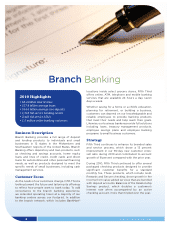Fifth Third Bank 2010 Annual Report Download - page 19
Download and view the complete annual report
Please find page 19 of the 2010 Fifth Third Bank annual report below. You can navigate through the pages in the report by either clicking on the pages listed below, or by using the keyword search tool below to find specific information within the annual report.MANAGEMENT’S DISCUSSION AND ANALYSIS OF FINANCIAL CONDITION AND RESULTS OF OPERATIONS
Fifth Third Bancorp 17
Dividends of $15 million were paid on February 2, 2011
when the Series F Preferred Stock was redeemed. The Bancorp
paid total dividends of $356 million to the U.S. Treasury while the
Series F Preferred Stock was outstanding. The Bancorp notified
the U.S. Treasury on February 17, 2011, of its intention to
negotiate for the purchase of the warrants issued to the U.S.
Treasury in connection with the CPP preferred stock investment.
Recent Legislative Developments
On July 21, 2010, the Dodd-Frank Act was signed into law. This
act significantly changes the financial services industry and affects
the lending, deposit, investment, trading and operating activities
of financial institutions and their holding companies. The
legislation establishes a Bureau of Consumer Financial Protection,
changes the base for deposit insurance assessments, gives the
Federal Reserve the ability to regulate and limit interchange rates
charged to merchants for the use of debit cards, and excludes
certain instruments currently included in determining Tier I
regulatory capital. This act calls for federal regulatory agencies to
adopt hundreds of new rules and conduct multiple studies over
the next several years in order to implement its provisions. While
the total impact of this legislation on Fifth Third is not currently
known, the impact is expected to be substantial and may have an
adverse impact on Fifth Third’s financial performance and growth
opportunities.
Earnings Summary
The Bancorp’s net income available to common shareholders for
2010 was $503 million, or $0.63 per diluted share, which was net
of $250 million in preferred stock dividends. The Bancorp’s net
income available to common shareholders was $511 million, or
$0.67 per diluted share, for 2009, which was net of $226 million in
preferred stock dividends. The Bancorp’s results for both years
reflect a number of significant items.
Such items affecting 2010 include:
• $152 million of noninterest income from the settlement
of litigation associated with one of the Bancorp’s BOLI
policies and $25 million of noninterest expense from
related legal fees;
• $110 million of noninterest expense from charges to
representation and warranty reserves related to
residential mortgage loans sold to third-parties; and
• $68 million of net interest income due to the accretion
of purchase accounting adjustments related to loans and
deposits from acquisitions during 2008.
For comparison purposes, such items affecting 2009 include:
• $1.8 billion of noninterest income from the Processing
Business Sale to Advent International;
• $244 million of noninterest income from the sale of the
Bancorp’s Visa, Inc. Class B common shares and a $73
million reduction to noninterest expense from the
release of Visa litigation reserves;
• $136 million of net interest income due to the accretion
of purchase accounting adjustments related to loans and
deposits from acquisitions during 2008;
• $106 million income tax benefit from the decision to
surrender one of the Bancorp’s BOLI policies and the
determination that previously recorded losses on the
policy are tax deductible;
• $31 million of noninterest expense from charges to
representation and warranty reserves related to
residential mortgage loans sold to third-parties;
• $55 million of noninterest expense from a special
assessment by the FDIC;
• $55 million income tax benefit from an agreement with
the IRS to settle all of the Bancorp’s disputed leverage
leases for all open years;
• $53 million in charges to other noninterest income
reflecting reserves recorded in connection with the
intent to surrender one of the Bancorp’s BOLI policies
as well as losses related to market value declines; and
• $35 million increase to net income available to common
shareholders from the exchange of 63% of outstanding
Series G preferred shares for approximately 60 million
common shares and $230 million in cash.
Net interest income increased to $3.6 billion, from $3.4
billion in 2009. The primary reason for the seven percent increase
in net interest income was a 39 bp increase in the net interest rate
spread due to the runoff of higher priced term deposits in 2010
and the benefit of lower rates offered on new term deposits, as
well as improved pricing on commercial loans. These benefits
were partially offset by a decrease in the accretion of purchase
accounting adjustments related to the 2008 acquisition of First
Charter, which were $68 million in 2010, compared to $136
million in 2009. Net interest margin was 3.66% in 2010, an
increase of 34 bp from 2009.
Noninterest income decreased 43% to $2.7 billion in 2010
compared to $4.8 billion in 2009, driven primarily by the
Processing Business Sale in the second quarter of 2009, which
resulted in a pre-tax gain of $1.8 billion, as well as a $244 million
gain related to the sale of the Bancorp’s Visa, Inc. Class B shares
in 2009. Mortgage banking net revenue increased $94 million as a
result of strong net servicing revenue and higher margins on sold
loans, partially offset by a decline in mortgage originations. Card
and processing revenue decreased 49% due to the Processing
Business Sale in the second quarter of 2009. Service charges on
deposits decreased $58 million primarily due to the impact of new
overdraft regulation and policies which resulted in a decrease in
overdraft occurrences. Investment advisory revenue increased $35
million as the result of improved market performance and sales
production that drove an increase in brokerage activity and assets
under care. Corporate banking revenue decreased two percent
largely due to decreases in international income and lease
remarketing fees, partially offset by growth in syndication and
business lending fees.
Noninterest expense increased $29 million, or one percent,
compared to 2009. Noninterest expense in 2010 included $25
million in legal fees associated with the settlement of claims with
the insurance carrier on one of the Bancorp’s BOLI policies while
noninterest expense in 2009 included a $73 million reduction in
the Visa litigation reserve as well as a $55 million FDIC special
assessment charge. Total personnel costs increased $94 million, or
six percent in 2010 compared to 2009, due primarily to
investments in the sales force in 2010. In addition, charges to
representation and warranty reserves related to residential
mortgage loans sold to third-parties totaled $110 million in 2010,
compared to $31 million in 2009 due to a higher volume of
repurchase demands. Partially offsetting these negative impacts
was a $123 million decrease in the provision for unfunded
commitments and letters of credit due to lower estimates of
inherent losses as the result of a decrease in delinquent loans
driven by moderation in economic conditions during 2010. In
addition, card and processing expense decreased $85 million
compared to 2009 due to the Processing Business Sale in June of
2009. Noninterest expense in 2010 and 2009 included $242
million and $269 million, respectively, of FDIC insurance and
other taxes.
The Bancorp does not originate subprime mortgage loans,
does not hold credit default swaps and does not hold asset-backed
securities backed by subprime mortgage loans in its securities
























